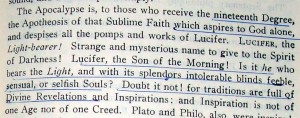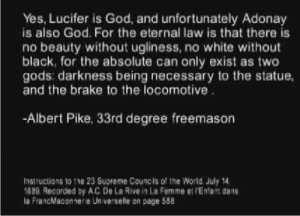Lúcifer: O Portador da Luz?!
O livro “Morals and Dogma“, escrito por Albert Pike, General-de-Brigada do Exército Confederado na Guerra Civil dos Estados Unidos da América e maçon de 33º grau, parece ser tratado como que a bíblia da maçonaria.
http://pt.wikipedia.org/wiki/Morals_and_Dogma

Como vêem na imagem, ele afirma que “Lucifer, the Son of the Morning”, que “Lucifer” é a “Estrela da Manhã” e o portador da Luz (Is it he who bears the Light… Doubt it not!).
Esta expressão aparece em Isaías 14:12.
—
Isaías 14:12:
Como você caiu dos céus, ó estrela da manhã, filho da alvorada! Como foi atirado à terra, você, que derrubava as nações!
English version of the Bible:
“How are you fallen from heaven, O Lucifer, son of the morning…”
—
“Lucifer” no Wikipédia:
Lucifer is the King James Version rendering of the Hebrew word הֵילֵל in Isaiah 14:12. This word, transliterated hêlēl or heylel, occurs only once in the Hebrew Bible and according to the KJV-influenced Strong’s Concordance means “shining one, morning star, Lucifer”.
The word Lucifer is taken from the Latin Vulgate, which translates הֵילֵל as lucifer, meaning “the morning star, the planet Venus” (or, as an adjective, “light-bringing”).
The Septuagint renders הֵילֵל in Greek as ἑωσφόρος (heōsphoros), a name, literally “bringer of dawn”, for the morning star. Kaufmann Kohler says that the Greek Septuagint translation is “Phosphoros”.
http://en.wikipedia.org/wiki/Lucifer
“Lúcifer” é a tradução da Versão Bíblica do Rei James da palavra hebraica הֵילֵל em Isaías 14:12. Esta palavra, transliterada de helel ou heylel, aparece apenas uma vez na Bíblia hebraica e de acordo com a Concordância Strong KJV (King James Version) – significa “aquele que brilha, estrela da manhã, Lúcifer”.
A palavra Lúcifer vem do Latim Vulgar, que traduz הֵילֵל como Lúcifer, que significa “estrela da manhã, o planeta Vénus” (ou, como adjectivo, o “portador da Luz”).
Os Septuagintas traduzem הֵילֵל em grego como ἑωσφόρος (heōsphoros), um nome, literalmente “o portador da Luz”, para a “estrela da manhã”. Kaufmann Kohler diz que a tradução grega Septuaginta é “Phosphoros”.
—
The two words “day star” are a translation of the one Greek word “phosphoros.” This comes from the two Greek words:
Phos (=light) + phero (=to bear or carry). Thus the Greek word “phosphoros” means Light-bearer or Light-bringer.
Anyone who knows both, Greek and Latin, can verify that the Greek word “Phosphoros” and the Latin word “Lucifer” are absolutely, one hundred percent identical in meaning. “Lucifer” is the perfect translation into Latin of the Greek word “Phosphoros.”
Fonte: http://www.israelofgod.org/lucifer.htm
As duas palavras “day star” são uma tradução de uma palavra grega “phosphoros”. Deriva de duas palavras gregas:
Phos (=Luz) + phero (= carregar ou portar). Assim a palavra grega “phosphoros” significa “o portador da Luz” ou “aquele que traz a Luz”.
Qualquer um que saiba ambas as linguas, grego e latim, pode verificar que a palavra grega “Phosphoros” e a palavra latina “Lucifer” são absolutamente, cem por cento idênticas em significado. “Lucifer” é a tradução perfeita para o Latim da palavra Grega “Phosphoros”.
—
Curioso:
They knew very well that 2 Peter 1:19 (And I will give him the morning star) refers without doubt to Jesus Christ. This verse calls Jesus Christ “Phosphoros” (in Greek) or “Lucifer” (in Latin). Yet the translators have hidden this fact behind the words “day star.” The facts are that “Phosphoros” has absolutely nothing to do with either “day” or “star”! The translators simply borrowed a term that is elsewhere used for Christ–namely “morning star” in Revelation 2:28 (Greek = proinos + aster) and in Revelation 22:16 (Greek = orthrinos + aster).
http://www.israelofgod.org/lucifer.htm
Eles sabiam muito bem que 2 Pedro 1:19-21 (E dar-lhe-ei a estrela da manhã.) se referia sem duvida nenhuma a Jesus Cristo. Este verso chama Jesus Cristo de “Phosphoros” (em grego) ou “Lúcifer” (em latim). No entanto os tradutores esconderam este facto por detrás das palavras “day star”. Os factos são que “Phosphoros” não tem nada a ver com “day” ou “star”. Os tradutores simplesmente emprestaram um termo que algures é usado para Cristo – nomeadamente “morning star” em Apocalipse 2:28 (Grego 0 proinos + aster) e em Apocalipse 22:16 (Grego = orthrinos + aster).
Apocalipse 22:16:
“Eu, Jesus, enviei o meu anjo para dar a vocês este testemunho concernente às igrejas. Eu sou a Raiz e o Descendente de Davi, e a resplandecente Estrela da Manhã.”
—
Adonai (em hebraico:מר, “meu Senhor”, ou “meus Senhores”, como discutido adiante) é o título de superioridade utilizado para Deus na Bíblia Hebraica (ou Velho Testamento, segundo a terminologia cristã). Nenhum outro título aplicado a Deus é mais definitivo do que este. – Wikipédia
—
Em “Pawns in a Game“:
Very few people seem able to appreciate that Lucifer is the brightest and most intelligent of the heavenly host and, because he is a pure spirit, he is indestructible. The scriptures tell us his power is such that he caused one-third of the most intelligent of the heavenly host to defect from God, and join him, because he claimed God’s Plan for the rule of the universe is weak and impractical because it is based on the premise that lesser beings can be taught to know, love, and wish to serve him voluntarily out of respect for his own infinite perfections. The Luciferian ideology states might is right. It claims beings of proven superior intelligence have the right to rule those less gifted because the masses don’t know what is best for them. The Luciferian ideology is what we call totalitarianism to-day.
Poucas pessoas parecem ser capazes de apreciar que Lúcifer é o mais brilhante e mais inteligente anfitrião celeste e, porque ele é um espírito puro, é indestrutível. As Escrituras contam-nos como o poder dele é tal que conseguiu com que um terço dos anfitriões celestes desertassem de Deus, e se juntassem a ele, alegando que o plano de Deus para o Universo era fraco e impraticável porque era baseado na premissa de que seres inferiores podem ser ensinados a conhecer, amar e a servi-Lo voluntariamente pelo respeito de Suas infinitas perfeições. A ideologia luciferiana alega que seres de inteligência superior têm o direito de governar os menos dotados porque as massas não sabem o que é melhor para elas. A ideologia luciferiana é a que hoje em dia chamamos totalitarismo.
—



Brutal Emanuel! Brutal! Temos de conversar mais 🙂 Beijoca